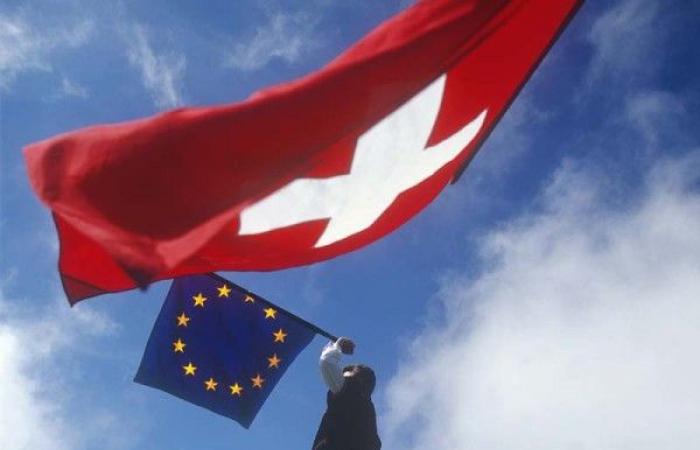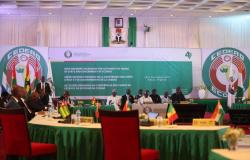“The solution found is in the interest of both parties,” said Viola Amherd. “We provide common responses to global realities that we all face,” said Ursula von der Leyen.
After 197 sessions, material negotiations with the EU are completed. The presidents of the European Confederation and Commission welcomed on Friday a historic agreement and a “milestone for the stabilization and development of relations between Switzerland and the EU.
“The solution found is in the interest of both parties,” said Viola Amherd. “We give common answers to global realities that we all face,” Ursula von der Leyen said at the Bernerhof.
In a context of high tensions on many fronts – technology, competition, war in Ukraine in particular – strong partnerships like that between Bern and Brussels are not only an advantage, but a necessity. Switzerland and the EU share common political, cultural and economic values.
For 25 years, the bilateral path has contributed to Switzerland's success. “We must consolidate and develop it so that it continues to bring its benefits,” indicated Foreign Minister Ignazio Cassis, alongside several of his colleagues.
“The Federal Council is convinced that the result of the negotiations constitutes a solid basis and consistent with the objectives,” he continued. The overall approach followed has proven effective. The Swiss delegation achieved the objectives set in the negotiating mandate. And Switzerland has succeeded in preserving Switzerland's essential interests, even strengthening them.
Immigration escape clause
Institutional issues will be directly integrated into the various sectoral agreements. The rules on state aid only apply in three areas: air transport, land transport and electricity. The public service is not concerned.
In the area of free movement, Switzerland will be able to maintain immigration oriented towards the needs of the economy. The agreement now provides for a safeguard clause.
Switzerland will be able to activate it alone to react to immigration which would cause serious economic problems, said the head of the Federal Department of Justice and Police Beat Jans. However, “measurable economic indicators” directly influenced by immigration will be required.
Return to Horizon Europe
Salaries will be protected. Switzerland will also be able to protect its interests in land transport, agriculture and electricity.
From January 1, 2025, Swiss players will be able to access almost all calls for tenders from Horizon Europe and the Euratom and Digital Europe programs. This is possible thanks to an arrangement for the transitional period from the end of 2024 to the entry into force of the package.
Switzerland has also committed to making a contribution in the area of cohesion for the years 2025 to 2029. This financial commitment amounts to 130 million francs per year. This sum will be directly allocated to programs and projects in Switzerland's partner countries within the EU. It will be due as soon as the package agreements come into force.
For 2030 to 2036, the annual amount will be 350 million francs. These contributions will finance joint programs and projects, particularly in the field of migration.
Work continues
Switzerland and the EU are also continuing their work on legal and translation aspects in order to finalize the agreements next spring. Until the package enters into force, Switzerland and the European Commission will work together to preserve the security and proper functioning of electricity networks.
Joint measures will be taken to protect citizens in the event of serious cross-border health threats. Discussions on the implementation of the Mutual Recognition Agreement for Conformity Assessments and on the regulation of financial markets will also continue.
For Switzerland, it is a question of moving on to the concrete implementation of the implementing laws. And, in domestic politics, the room for maneuver is important, underlined Mr. Cassis.
Negotiations are still underway with the social partners, particularly on the protection of wages, a central element for the unions, recalled the Minister of the Economy Guy Parmelin. But, he assured, “the salary level is guaranteed with the new agreement”.
This includes principles, exceptions and a “non-regression” clause in order to guarantee Swiss specificities, as well as accompanying measures, he explained.
A message and four federal decrees
The Federal Department of Foreign Affairs, together with the other departments, is responsible for preparing the message on the overall Switzerland-EU package. The federal government will make a final assessment before the summer break, Cassis said. For now, he assumes that the overall message will be divided into two parts.
A first so-called stabilization part will bring together in a federal decree the development of existing agreements, the rules on state aid, participation in EU programs and Switzerland's contribution. The three new agreements, electricity, health, food security, will be presented separately in three federal “development” decrees.
The Federal Council will then decide on the structure of the package and the nature of the referendum. The final decision rests with the Federal Chambers, which will take up the matter from 2026. They will have to decide on the four federal decrees, if this solution is retained after the consultation.






